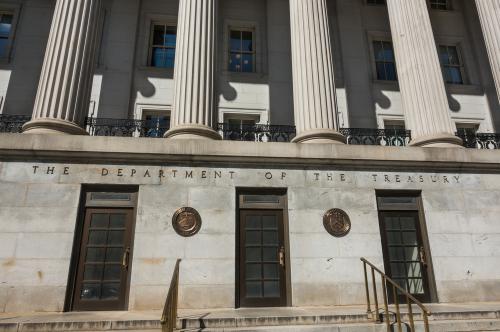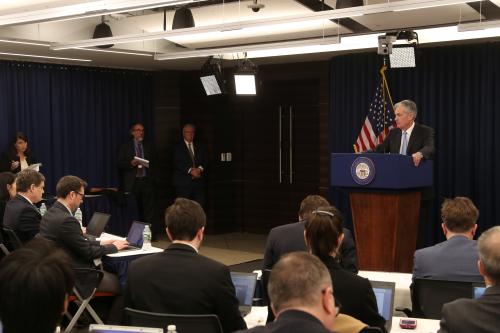At a time of national crisis, concern over numbers—surpluses, budget rules, debt reduction—may seem like putting a green eye-shade above the red- white-and-blue.
While President George W. Bush is clearly right that we need to make temporary exceptions in war and recession, the economic and security situation today also makes the case for maintaining long-term fiscal discipline.
There is nothing inconsistent in this. One reason a nation should seek a savings cushion is to be able to load its financial cannons to address short-term crises without unduly hurting its economic potential.
Currently, the case for providing an extra dose of stimulus is becoming stronger: more stimulus could help consumer spending and offset fears about terrorism that would undercut an economy already showing signs of fragility.
The case for long-term discipline is also growing stronger. Markets may yet shrug off one-time expenditures for fighting terrorism and economic weakness. However, a signal that debt reduction now is out and that deficits are back in style could hurt confidence in our fiscal future and help raise long-term interest rates.
Higher long-term interest rates would damage not only key business investment but the housing purchases that are one of the economy’s few bright spots this year.
Priorities
When it comes to security, the crisis is a reminder that a great nation must have savings in reserve for emergencies. The turnaround in our fiscal situation a few years ago allowed the Federal Reserve to address Asia’s financial crisis. Now, our surpluses give us greater capacity to address terrorism and economic weakness at home.
The good news is there is significant potential for a bipartisan plan that will furnish economic stimulus without financially hamstringing the nation in years to come.
First, we must rebuild New York and restore the Pentagon as swiftly as possible.
Rebuilding what was destroyed by terrorism will not only stimulate the economy but also help restore the national psyche. As this national imperative is a one-time cost, it will have little impact on our long-term fiscal discipline.
Second, Congress should pass a one-time winter holiday tax cut in the form of a rebate on payroll taxes. It would prove particularly beneficial for the 29 million workers who pay payroll and federal excise taxes, but who had too little income to be eligible for the first rebate. Concentrating the bulk of the rebate on such lower- and moderate-income families will be more stimulative, as they are most likely to spend it quickly.
Incentives
If the checks are out by the Christmas shopping season, the nation’s stores no doubt would offer customers tempting deals and inducements that would let this one-time tax cut bolster the economy without undermining our future finances.
A temporary business-investment incentive should also be considered, if it can be designed for a short-term boost that won’t damage long-term fiscal discipline.
Whatever you may think of lowering capital-gains taxes, it is the wrong medicine for our current economic illness: The proposal could provide the incentive to sell stocks without guaranteeing that the money will be reinvested and not banked—absolutely not what our economy needs right now.
A better idea would be a temporary investment tax credit or accelerated depreciation on capital spending that’s usually written off over a longer term—if the costs are incurred between September 11 and June 11. This one-time offer could encourage businesses to accelerate spending in the coming critical months when the economy needs the most help. This idea passes the financial discipline test since such temporary incentives simply accelerate tax savings that the federal government largely recaptures in years to come.
To work, such measures must truly be temporary. If businesses believe policymakers are just winking when so-called temporary measures are enacted, they may put off taking steps the economy needs for a short-term boost.
Discipline
Travel security right now is crucial for restoring consumer confidence. Emergency legislation should provide whatever funds are needed to combat any terrorist threats to travel and national security.
Because many such measures may require permanent costs, Congress and the administration should impose on themselves the following discipline: no long-term costs should be assumed—however virtuous—until we have enough perspective to consider how these should be funded.
Both Democrats and Republicans must take the time to rethink how our existing spending and tax-cut priorities should be altered to ensure that we can combat terrorism without forgoing our obligations to invest in our children, to ensure savings for Social Security, and to keep our economy strong and productive.
If we choose wisely, we will have the capacity to find the resources to defend America while still investing in its future.
The Brookings Institution is committed to quality, independence, and impact.
We are supported by a diverse array of funders. In line with our values and policies, each Brookings publication represents the sole views of its author(s).



Commentary
Op-edIn Crisis, Stimulus and Discipline Go Together
September 21, 2001